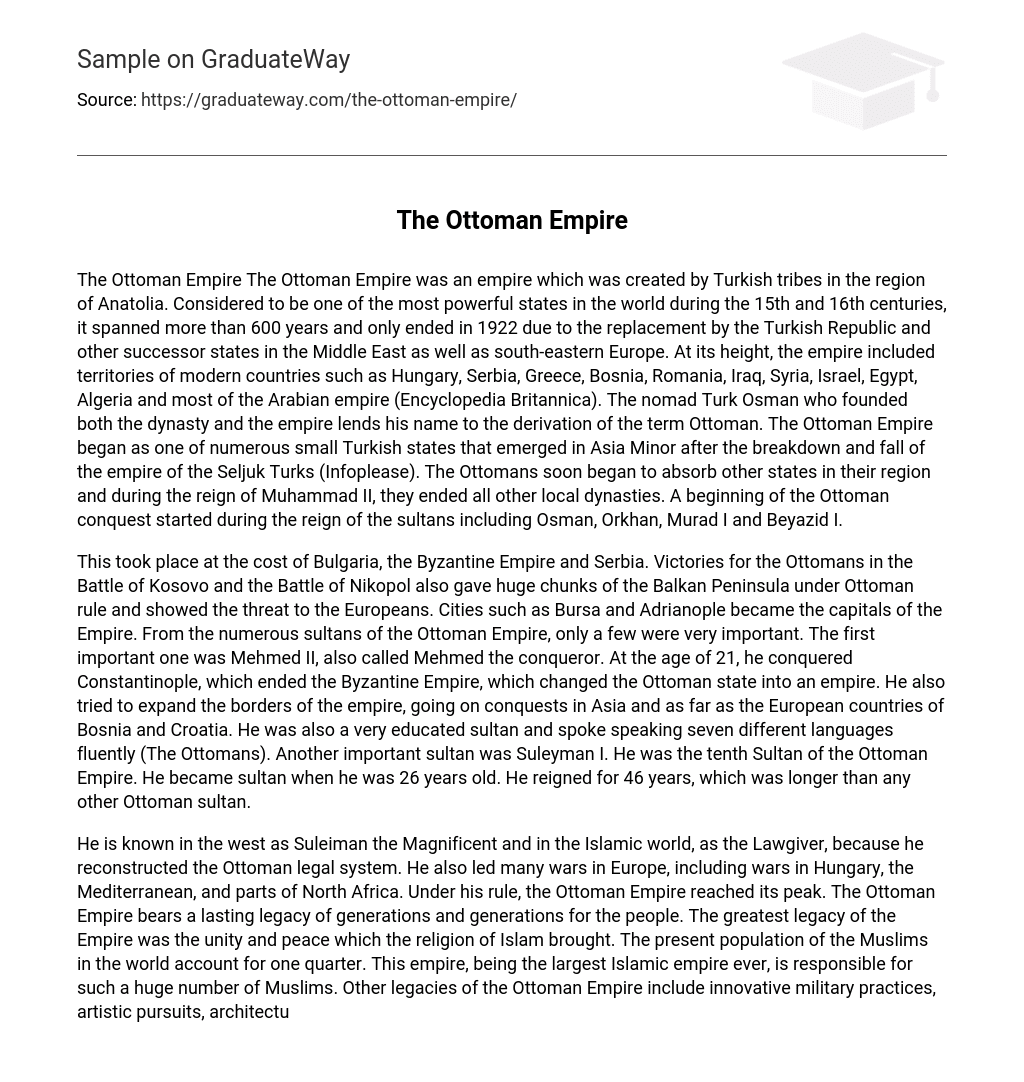The Ottoman Empire was an empire which was created by Turkish tribes in the region of Anatolia. Considered to be one of the most powerful states in the world during the 15th and 16th centuries, it spanned more than 600 years and only ended in 1922 due to the replacement by the Turkish Republic and other successor states in the Middle East as well as south-eastern Europe. At its height, the empire included territories of modern countries such as Hungary, Serbia, Greece, Bosnia, Romania, Iraq, Syria, Israel, Egypt, Algeria and most of the Arabian empire (Encyclopedia Britannica).
The nomad Turk Osman who founded both the dynasty and the empire lends his name to the derivation of the term Ottoman. The Ottoman Empire began as one of numerous small Turkish states that emerged in Asia Minor after the breakdown and fall of the empire of the Seljuk Turks (Infoplease). The Ottomans soon began to absorb other states in their region and during the reign of Muhammad II, they ended all other local dynasties. A beginning of the Ottoman conquest started during the reign of the sultans including Osman, Orkhan, Murad I and Beyazid I.
This took place at the cost of Bulgaria, the Byzantine Empire and Serbia. Victories for the Ottomans in the Battle of Kosovo and the Battle of Nikopol also gave huge chunks of the Balkan Peninsula under Ottoman rule and showed the threat to the Europeans. Cities such as Bursa and Adrianople became the capitals of the Empire. From the numerous sultans of the Ottoman Empire, only a few were very important.
The first important one was Mehmed II, also called Mehmed the conqueror. At the age of 21, he conquered Constantinople, which ended the Byzantine Empire, which changed the Ottoman state into an empire. He also tried to expand the borders of the empire, going on conquests in Asia and as far as the European countries of Bosnia and Croatia. He was also a very educated sultan and spoke speaking seven different languages fluently (The Ottomans).
Another important sultan was Suleyman I. He was the tenth Sultan of the Ottoman Empire. He became sultan when he was 26 years old. He reigned for 46 years, which was longer than any other Ottoman sultan.
He is known in the west as Suleiman the Magnificent and in the Islamic world, as the Lawgiver, because he reconstructed the Ottoman legal system. He also led many wars in Europe, including wars in Hungary, the Mediterranean, and parts of North Africa. Under his rule, the Ottoman Empire reached its peak.
The Ottoman Empire bears a lasting legacy of generations and generations for the people. The greatest legacy of the Empire was the unity and peace which the religion of Islam brought. The present population of the Muslims in the world account for one quarter. This empire, being the largest Islamic empire ever, is responsible for such a huge number of Muslims. Other legacies of the Ottoman Empire include innovative military practices, artistic pursuits, architectural wonders and different institutional and bureaucratic practices (establishmentblues).
The decline of the Ottoman Empire started with the Battle of Vienna and the Treaty of Karlowitz. The empire had been experiencing many economic and political setbacks before the decline. Ottomans were trying to catch up on the western world by military reforms that were ultimately ineffective. Many losses at wars also weakened the empire’s boundaries, military and economy, which accelerated the fall of the Ottoman Empire. Soon, many rallies took place amongst ethnic groups and a huge war took place against Russia, which cause a breakdown for them.
The Ottoman Empire fought against the Allies in WW1, resulting in a loss and a partition of all their states. This gave rise to the Turkish War of Independence, ending a six century long empire and replacing it by the Republic of Turkey. The Ottoman Empire was an empire centrally located in Turkey, which lasted for around six centuries.
A really influential empire, it shaped the future for Turkey as well its surrounding countries. Without the existence of the Ottoman Empire, many events that happened as a result of this would be voided. Many people from all over the world visit Turkey and see the legacy they left behind everywhere. This way, the whole world was affected by the existence of the Ottoman Empire. If this did not happen, this world would have been a very different place.
Bibliography
- “Ottoman Empire (historical Empire, Asia).” Encyclopedia Britannica Online. Encyclopedia Britannica, n.d. Web. 03 Nov. 2013. Infoplease. Infoplease, n.d. Web. 03 Nov. 2013.
- “The Sultans: Selim I.” The Ottomans. N.p., n.d. Web. 03 Nov. 2013. “The Lasting Legacy of the Ottoman Empire.” Establishmentblues. N.p., n.d. Web. 03 Nov. 2013.





